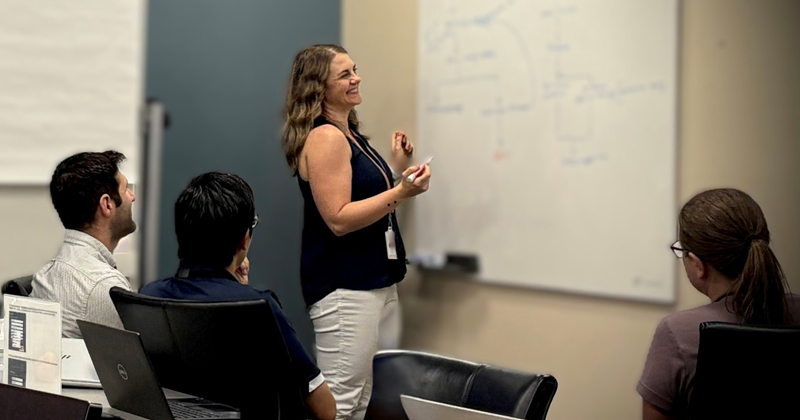UD PCS’ Dynamic Leadership Certificate advances career growth
Julie Harris, a chemical engineer, knows that women in leadership roles in her field are rare — but she’s never let that stop her from forging her own path. When the opportunity arose to join her company’s team in the University of Delaware’s Division of Professional and Continuing Studies (UD PCS) Dynamic Leadership Certificate program, Harris, who works at W. L. Gore & Associates, was ready.
Her motivation? A passion for helping others grow and a desire to expand her influence beyond technical contributions.
“When I joined Gore, I had experience in environmental and process engineering, and I enjoyed the technical side,” Harris said. “But I found myself increasingly drawn to mentorship and helping people develop — helping them succeed.”
Harris’ path to leadership began with informal mentoring and gradually evolved into a formal role as lead engineer. As her responsibilities grew, she recognized the limits of her influence as an individual contributor and became intentional about expanding her impact.
“I started to feel a ceiling in terms of broader influence,” Harris said. “So, I actively sought out opportunities to grow into leadership — charting a path and building the experience I’d need when the right role came along.”
That commitment led to her current role, where she oversees a team of 13 process, quality and lead engineers across two locations and five platforms. To continue developing her leadership skills, Harris enrolled in the UD PCS Dynamic Leadership Certificate program. While she had participated in other leadership training courses before, this program stood out for its practical, actionable insights.
“It offered specific nuggets of knowledge I felt were missing from my development as a leader,” she said.
One of the most valuable takeaways for Harris was learning how to create a collaborative, inclusive process for team monitoring and review — one that advances the team’s work without feeling overly authoritative. The program introduced her to five key dynamics of high-performing teams: direction (clear goals), connection (trust), adaptability, attitude (risk-taking and resilience) and performance (accountability and productivity). These dynamics gave Harris a framework to both assess and showcase her team’s strengths.
“I’ve always known my team was strong, but I struggled to articulate what made them high performing,” she explained. “The leadership program broke it down into measurable dynamics, which really resonated with me as an engineer who loves data. I took those metrics back to my team, and we use them to assess and strengthen how we work together.”
The concept of psychological safety — where team members feel safe to speak up, take risks and share ideas — was especially impactful. Although new to Harris, she quickly recognized its presence within her team and saw an opportunity to share it more broadly.
“Psychological safety was a new concept for me, but once I understood it, I realized my team already had a strong foundation,” Harris said. “I wanted to share that knowledge, so I led a lunch-and-learn with other engineering leaders. It’s become a reference point in our conversations about team dynamics.”
Her team responded enthusiastically to the new framework. At Gore, open dialogue is part of the culture, but Harris’ structured approach helped unify three distinct sub-teams under a shared vision.
“The feedback I received was incredibly positive,” she said. “For the first time, we began working as a unified function rather than separate silos. The clarity and alignment we’ve achieved have made a real difference in how we collaborate.”


